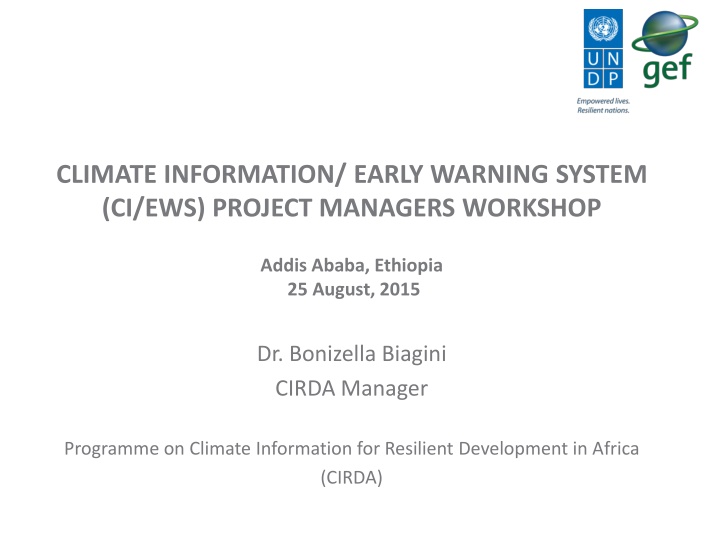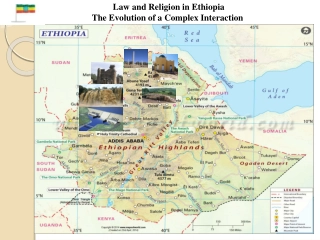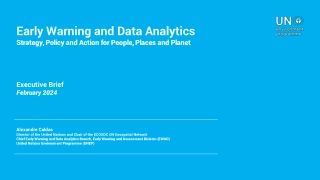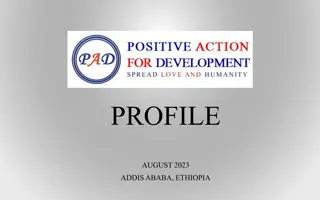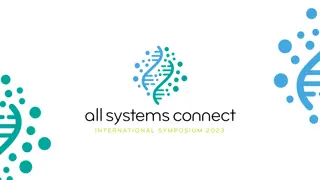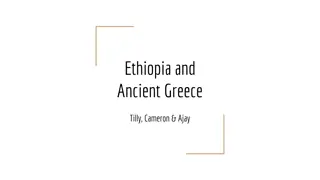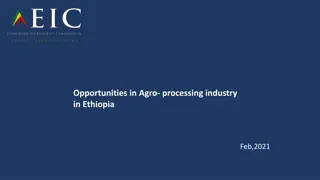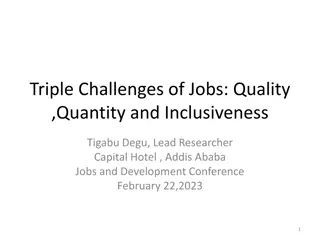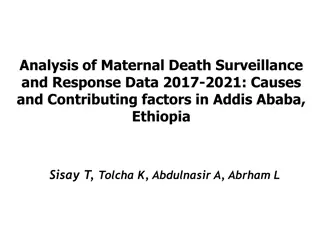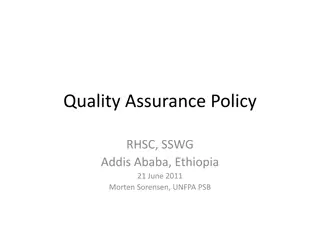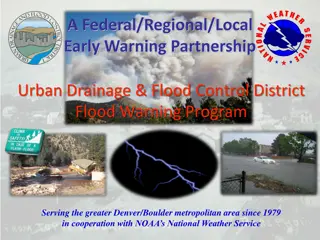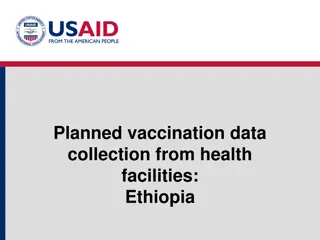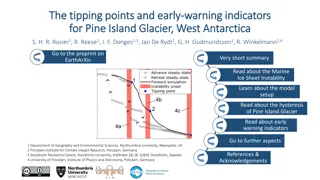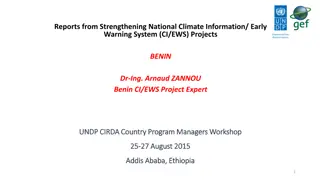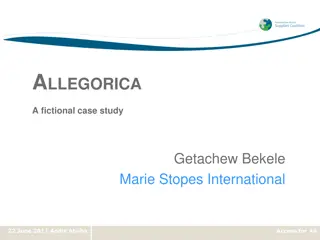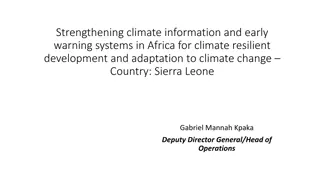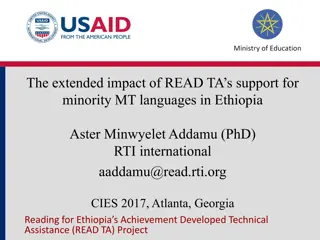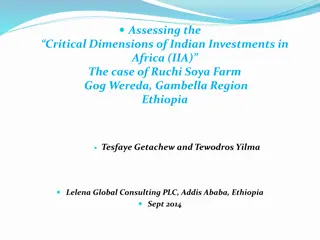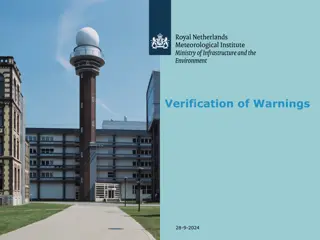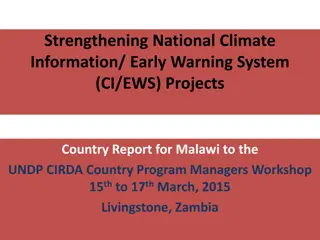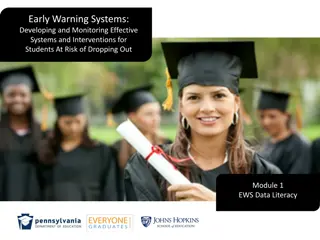Climate Information & Early Warning System Project Managers Workshop - Addis Ababa, Ethiopia
The Climate Information & Early Warning System (CI/EWS) project, managed by Dr. Bonizella Biagini of CIRDA, aims to support 11 countries in Africa, focusing on providing reliable weather and climate data for early warning systems and adaptation. The project emphasizes capacity building, technology transfer, private sector engagement, and enhancing climate services for long-term planning and resilience.
Download Presentation

Please find below an Image/Link to download the presentation.
The content on the website is provided AS IS for your information and personal use only. It may not be sold, licensed, or shared on other websites without obtaining consent from the author.If you encounter any issues during the download, it is possible that the publisher has removed the file from their server.
You are allowed to download the files provided on this website for personal or commercial use, subject to the condition that they are used lawfully. All files are the property of their respective owners.
The content on the website is provided AS IS for your information and personal use only. It may not be sold, licensed, or shared on other websites without obtaining consent from the author.
E N D
Presentation Transcript
CLIMATE INFORMATION/ EARLY WARNING SYSTEM (CI/EWS) PROJECT MANAGERS WORKSHOP Addis Ababa, Ethiopia 25 August, 2015 Dr. Bonizella Biagini CIRDA Manager Programme on Climate Information for Resilient Development in Africa (CIRDA)
CIRDA Overview Provides support to 11 countries. GEF-LDCF support USD 50 Million for National Projects USD 4 Million for Multi Country Support Burkina Faso Global Support Program focus The Gambia Sierra Leone Ethiopia Benin Uganda Liberia Access to reliable weather and climate data for EWS & adaptation Data processing and dissemination Tech transfer and capacity building Weather products for end users Contribution to NAPs Private Sector Sustainability S oTom andPr ncipe Tanzania Zambia Malawi 2
CIRDA Objectives General: Support national climate services in their efforts to collect, analyse and disseminate climate information for long term planning and adaptation. Specific Objectives: Meet the need to generate, process and disseminate high quality and timely weather and climate data that is comprehensive, reliable, accessible and in a form that end users can understand and apply Provide effective early warnings of extreme weather event to save lives Enable vulnerable communities, farmers and policymakers to access and use climate data to make informed decisions to respond to a changing climate Bring innovative, reliable, low cost, easily maintained technologies with national coverage and cellular links to hydromet agencies Engage private sector users of weather data as partners to ensure the sustainability of improved weather observation systems 3
CIRDA Support: 2015 Annual Workplan Outcome 2: Efficient and effective use of climate/weather information for generating EWS and supporting long-term development and adaptation plans Outcome 1: Enhanced capacity to monitor and forecast extreme weather, hydrology and climate change Deployment of experts to all partner countries (technologies, hydromet and forecasting) Technical support for the digitization of existing climate data Ongoing high level expert support on alternative technologies and meteorology Training workshops on private sector opportunities and communication & application development Support for developing national procurement plans, identifying appropriate technology, developing tech maintenance plans Market study on the marketable potential of climate/weather information and its revenue generating capacity to NHMS Missions to identify international best practices (Weather Phillippines) Development of a private sector strategy 4
CIRDA Ongoing Work Technical assistance to national project teams On hydrology, innovative technologies, meteorology and forecasting, among others (misions to Burkina Faso, Uganda, Ethiopia and Zambia) Dissemination of online resources for information sharing (CIRDA Newsletter: Climate Connections) Mission to streamline support on the digitization of existing information South-South Cooperation Identify best practices: Weather Phillipenes/Meteo Group Private sector engagement Market study to identify partnerships and potential for revenue streams. Study will result in various market models applicable to the region. Workshops on private sector engagement (Uganda) and application development (Zambia) Procurement support to enhance national capacities and facilitate the procurement of technical equipment Linking the projects to a broader developmental conversation Publication on Engaging the Private Sector Communication strategy to share achievements, best practices, lessons learned 5
Opportunities under CIRDA Cooperation and support (regional and multi-country) climate information should not be limited by national boundaries Identify multiple steps to be taken from the generation of data to its utilization by the end-users Explore possibilities created by innovative technologies (soft and hard) and new means of communication (e.g. cell phones) Multi-stakeholders involvement governments lead but they cannot do it alone The private sector has technologies, expertise, and resources to respond to climate risks PPPs generate revenue and make climate systems more sustainable Civil society works at a community level and is key to adaptation 6
Goals of this workshop Facilitate a dialogue among national project managers and national implementers Identify and better understand national needs and capacity gaps Share common challenges and possibly identify common solutions among national practitioners Discuss the effectiveness of the support provided through CIRDA to national project teams Stocktaking of what has been achieved so far 7
Thank you Dr. Bonizella Biagini CIRDA Manager UNDP-GEF bonizella.biagini@undp.org www.undp-alm/porjects/cirda www.undp-cirda.blogspot.com 8
